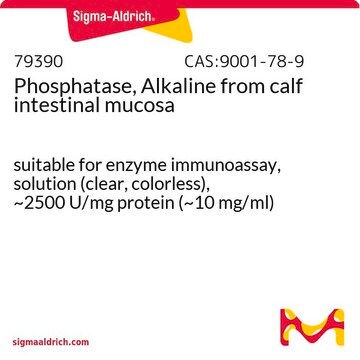Application
Alkaline phosphatase can be used to dephosphorylate casein and other proteins. Alkaline phosphatase may be also be used to dephosphorylate the 5′-termini of DNA or RNA to prevent self-ligation. DNA or RNA can also be tagged with radiolabeled phosphate (via T4 polynucleotide kinase) after dephosphorylation with alkaline phosphatase..
Alkaline phosphatase is used for conjugation to antibodies and other proteins for ELISA, Western blotting, and histochemical detection. It is routinely used to dephosphorylate proteins, such as casein, and nucleic acids. It may be used for protein labeling when high sensitivity is required. Alkaline phosphatase may be also be used to dephosphorylate the 5′-termini of DNA or RNA to prevent self-ligation. DNA or RNA can also be tagged with radiolabeled phosphate (via T4 polynucleotide kinase) after dephosphorylation with alkaline phosphatase.. Product P6774 has been used during preparation of brain lysate.
High specific activity grade recommended for antibody and protein conjugation.
The enzyme from Sigma has been used in the preparation of AP-BGG (alkaline phosphatase-bovine gamma globulin) conjugates. It has been conjugated to sheep anti-rabbit IgG and sheep anti-rabbit IgM in immunological assays. It has also been used to prepare double-enzyme conjugates with HRP for the simultaneous detection of three different intracellular Ig determinants in a single tissue section.
Biochem/physiol Actions
Alkaline phosphatase, from bovine intestinal mucosa, is most stable in the pH range 7.5-9.5. The enzyme has a broad specificity for phosphate esters of alcohols, amines, pyrophosphate, and phenols and it requires zinc, and magnesium or calcium divalent ions for activity.
The enzyme has a broad specificity for phosphate esters of alcohols, amines, pyrophosphate, and phenols. It is routinely used to dephosphorylate proteins and nucleic acids.
The enzyme is a glycoprotein containing approximately 12% carbohydrate (6% hexoses and 6% other neutral sugars). Each molecule of alkaline phosphatase contains four zinc atoms and four disulfide bridges. Maximal activity with alkaline phosphatase is achieved in the presence of magnesium. It catalyzes the hydrolysis of phosphate monoesters such as p-nitrophenyl phosphate, phenyl phosphate, phenolphthalein phosphate, α-glycerol phosphate, β-glycerol phosphate, 2-phosphorylglycerate, triosephosphate, glucose-6-phosphate, glucose 1-phosphate, fructose 1-phosphate, fructose 6-phosphate, adenosine 5-phosphate adenosine 3-phosphate, phosphoenolpyruvate, and β-nicotinamide adenine dinucleotide phosphate. Arsenate, cysteine, iodine, inorganic phosphate, pyrophosphate, diisopropyl phosphate, triphenylphosphate, diisopropyl fluorophosphate, and L-phenylalanine are some of the strong inhibitors of alkaline phosphatase.
Physical properties
Bovine intestinal alkaline phosphatase is a dimeric, membrane-derived glycoprotein. At least three isoforms exist, which typically possess two N-linked and one or more O-linked glycans per monomer.
Bovine intestinal alkaline phosphatase is a dimeric, membrane-derived glycoprotein. At least three isoforms exist, which typically possess two N-linked and one or more O-linked glycans per monomer.2 The enzyme requires zinc, and magnesium or calcium divalent ions for activity.
Unit Definition
One DEA unit will hydrolyze 1 μmole of 4-nitrophenyl phosphate per minute at pH 9.8 at 37 °C. (One glycine unit is equivalent to ~3 DEA units)
Physical form
Solution in 3.0 M NaCl containing 5 mM MgCl2, 0.2 mM ZnCl2, and 30 mM triethanolamine, pH 7.6
Preparation Note
Affinity purified
Analysis Note
Package sizes are based on DEA units
Protein determined by biuret.








